
 Flash News
Flash News
Ndahet nga jeta tragjikisht në moshën 28-vjeçare ylli i Liverpool, Diogo Jota
Posta e mëngjesit/ Me 2 rreshta: Çfarë pati rëndësi dje në Shqipëri
Ceno Klosi with over 800 stolen votes, Balluku finds the reason is the tiredness of the counters
"Fast & Furious" in the former Block, police chase an Audi Q8, 4 cars collide
Car hits two tourists on a motorcycle in Fushe Arrëz, one of them dies

Alfred Lela
Rama's speech in tribute to the writer Ismail Kadare achieved what the prime minister's gestures quite often achieved: to talk about the details and forget the essence.
The passing on, or encouragement, of Ismail Kadare, the best writer in Albanian and one of the most prominent in the world, should have been the day of the public separation of his readers and well-wishers with him, not the union in vanity, once and for all, with The Prime Minister Sun transgressions.
Sources close to the family say that it was not Mrs. Kadare who offered the eulogy speech, but this was the way for the family to get rid of many speeches since the government's "offer" was for some of the cabinet and courtiers to speak (and God forbid! Elisa herself).
So the sentence "Ismaili would have loved only you, Edi" was an honorable exit from a desecrating situation.
What stood out is that even Rama himself, who has the necessary culture not to fall into the banality that his subordinates fall into every day, was caught not only in his delirium but also in what can be called a 'head battle'. ' He had an imaginary encounter with 'gravediggers'. That tirade might have been for a Facebook post, but it was miles beyond the requirements of a eulogy, which intends the departed, not the departer, the eternal, not the current.
Eulogies are more successful when they also contain doses of humor or irony, such that they aim, without poison, not only at the author but also at the one for whom they are written and who is already in the life of the successor.
Rama directed all the irony towards a third party, imaginary or real, who had no place around the coffin where the master of the grotesque rested.
Mr. Rama wanted to wear it to others (gravediggers), presenting them as characters of Kadare in an imaginary novel that was impossible to write already; in fact, it suited him.
Thus, Edi Rama ended a peaceful relationship with Ismail Kadare (perhaps eased in recent years by his power) that began in 1991. Found in his favorite momentum that of the iconoclast, Edi Rama at that time at the beginning of political persons, together with a group of friends—among them Ardian Klosi—had as their goal the 'overthrow' of the myth of Kadare and the rise of Kasem Trebeshina.
Their friends say that he also called Spartak Njëla to this anti-Kadare lodge, at that time just released from prison. Njjela, cynical as always, responded to the offer like this: "You're waiting. Don't get involved in these things because Kadareja will put you in some novel and take out the ink!"
They didn't end in Kadare's novels, but maybe they did in the romances of his conversations. What did not end during the two decades, however, was a counter-culture (perhaps the first step of cancel culture here in our country) in the debate on Albanian literature, rooted in the movement of Rama & CO to cancel Kadare and elevate Kasem Trebeshina. A naive and out-of-place debate was extended through the pages of the literary appendices of the time about the superiority of Trebeshina over Kadare. A thing that everyone's work had already decided. A distance that is even less read in literature would be understood as an insurmountable gap.
This "head battle" with Kadare, which probably has its roots in Rama's self-consciousness (self-complaints complemented by the courtesans), was completed by a Trashanic mistake. It is not so much the confusion of Agron Tufa's Mayakovsky with Ismail Kadare's that is problematic but the fact that, in the eulogy of the greatest Albanian author, the eulogist does not bring an original creation of the author but a translation.
Helena, for example, knows what Ismaili thought about a writer's 'time wasted on translations.'
For whom did Edi Rama eulogize, for the Russian poet Majakovski or the Albanian writer Ismail Kadare, whose original work has thousands of fragments worthy of reading? Rama himself knows what happened in this case. He trusted whom he took it to and did not check, or are these the punishments of chance? He went and read the translation of Agron Tufa, a writer who sought political asylum in Switzerland to escape his government, in the tributes to the writer Ismail Kadare, who, together with a small group of former Bloc and marginals, wanted replace at the top of the Albanian papers with Kasem Trebeshina, an author who, like Rama and his friends, could have a life, but had no work.
Latest news

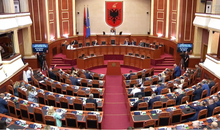
Democratic MP talks about the incinerator, Spiropali turns off her microphone
2025-07-03 10:39:24

Ndahet nga jeta tragjikisht në moshën 28-vjeçare ylli i Liverpool, Diogo Jota
2025-07-03 10:21:03
Cocaine trafficking network in Greece, including Albanians, uncovered
2025-07-03 10:10:12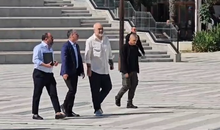


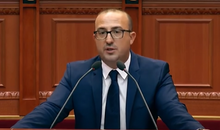
Korreshi: Election manipulation began long before the voting date
2025-07-03 09:39:13
Arrest of Greek customs officer 'paralyzes' vehicle traffic at Qafë Botë
2025-07-03 09:28:41
After Tirana and Fier, the boxes are opened in Durrës today
2025-07-03 09:21:10
Enea Mihaj transfers to the USA, will play as an opponent of Messi and Uzun
2025-07-03 09:10:04

Foreign exchange, the rate at which foreign currencies are sold and bought
2025-07-03 08:53:50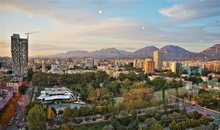
Index, Albania has the worst quality of life in Europe
2025-07-03 08:48:10


Horoscope, what do the stars have in store for you today?
2025-07-03 08:17:05
Clear weather and high temperatures, here's the forecast for this Thursday
2025-07-03 08:00:37
Posta e mëngjesit/ Me 2 rreshta: Çfarë pati rëndësi dje në Shqipëri
2025-07-03 07:46:48




Lufta në Gaza/ Pse Netanyahu do vetëm një armëpushim 60-ditor, jo të përhershëm?
2025-07-02 21:56:08
US suspends some military aid to Ukraine
2025-07-02 21:40:55



Methadone shortage, users return to heroin: We steal to buy it
2025-07-02 20:57:35
Government enters oil market, Rama: New price for consumers
2025-07-02 20:43:30
WHO calls for 50% price hike for tobacco, alcohol and sugary drinks
2025-07-02 20:41:53







Israel agrees to 60-day ceasefire in Gaza, but many unanswered questions remain
2025-07-02 18:35:27
The weather in Germany is going "crazy", temperatures reach 40°C
2025-07-02 18:22:21

"Fast & Furious" in the former Block, police chase an Audi Q8, 4 cars collide
2025-07-02 17:59:25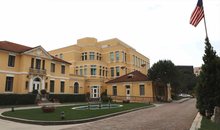
"Birth on a tourist visa? US Embassy warns Albanians: This is prohibited!"
2025-07-02 17:48:16


BIRN: Fier recount reveals vote trafficking within open political party lists
2025-07-02 16:57:19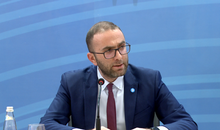

CEO and former director of 'Bankers Petroleum' arrested in Fier
2025-07-02 16:40:42
Car hits two tourists on a motorcycle in Fushe Arrëz, one of them dies
2025-07-02 16:33:23



Fire at the Elbasan Incinerator Landfill, Prosecution Launches Investigations
2025-07-02 15:34:54
What you need to know if you travel to a country with active volcanoes
2025-07-02 15:33:03



EU proposes 90% reduction in greenhouse gases by 2040
2025-07-02 14:50:23
Europe is burning from the heat / Italy and France are on maximum alert
2025-07-02 14:36:52

Moscow's contradictory statements: Is the friendship with Vučić breaking down?
2025-07-02 14:21:05
'I lost my battle': Sea warming is killing fishing in Albania
2025-07-02 14:08:35
Sekretet kimike që ndihmojnë në mbajtjen e mjaltit të freskët për kaq gjatë
2025-07-02 14:01:26

Denmark makes historic decision to make military service mandatory for women
2025-07-02 13:44:33
The appeal of the GJKKO leaves former judge Pajtime Fetahu in prison
2025-07-02 13:30:20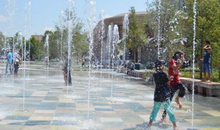
Productivity losses could reduce GDP by 1.3% as a result of extreme heat
2025-07-02 13:21:04
He abused his minor daughter, Zamir Meta is left in prison
2025-07-02 13:04:04

Waste burning in Elbasan, Alizoti: They are poisoning people and stealing money
2025-07-02 12:48:39
Civil disobedience continues in Serbia, dozens of people detained
2025-07-02 12:40:32
Rama's government was born under the sign of garbage and will end like this
2025-07-02 12:28:09
Water prices increase in the municipalities of the Elbasan region
2025-07-02 12:13:38
Civil disobedience continues in Serbia, what is happening in Belgrade?
2025-07-02 12:07:44
Serious accident in Thumanë, one dead, 3 injured
2025-07-02 11:54:42
Durrës Court suspends the director of Pre-University Education from duty
2025-07-02 11:49:27
Plenary session on Thursday, what is expected to be discussed
2025-07-02 11:36:43
Europe is burning from heat waves/ What is the 'thermal dome' phenomenon?
2025-07-02 11:26:25
Wanted by Italy for murder, 45-year-old arrested in Vlora
2025-07-02 11:19:31
Fire situation, 28 fires reported in 24 hours, 2 still active
2025-07-02 11:13:20
"Buka" file, preliminary hearing for Ahmetaj postponed to July 17
2025-07-02 11:03:30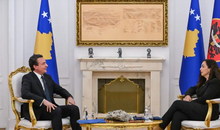


Baçi: Belinda Balluku and Ceno Klosi, the most dangerous "gangs" in Fier
2025-07-02 10:32:09
Zamir Meta, suspected of sexually abusing his daughter, arrives in court
2025-07-02 10:21:33

Trump: Israel has agreed to a 60-day ceasefire in Gaza
2025-07-02 10:01:55
Fire continues at Elbasan landfill
2025-07-02 09:51:13

Dates to note during July, important events will occur
2025-07-02 09:31:45
The hearing for Jorgo Goro's claim is postponed
2025-07-02 09:24:19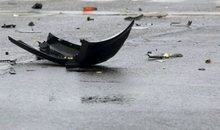



Foreign exchange, the rate at which foreign currencies are sold and bought
2025-07-02 08:42:31

52% of pensioners did not receive full pension in 2024
2025-07-02 08:27:18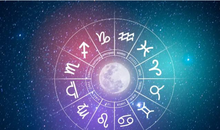
Horoscope, what do the stars have in store for you today?
2025-07-02 08:13:36
